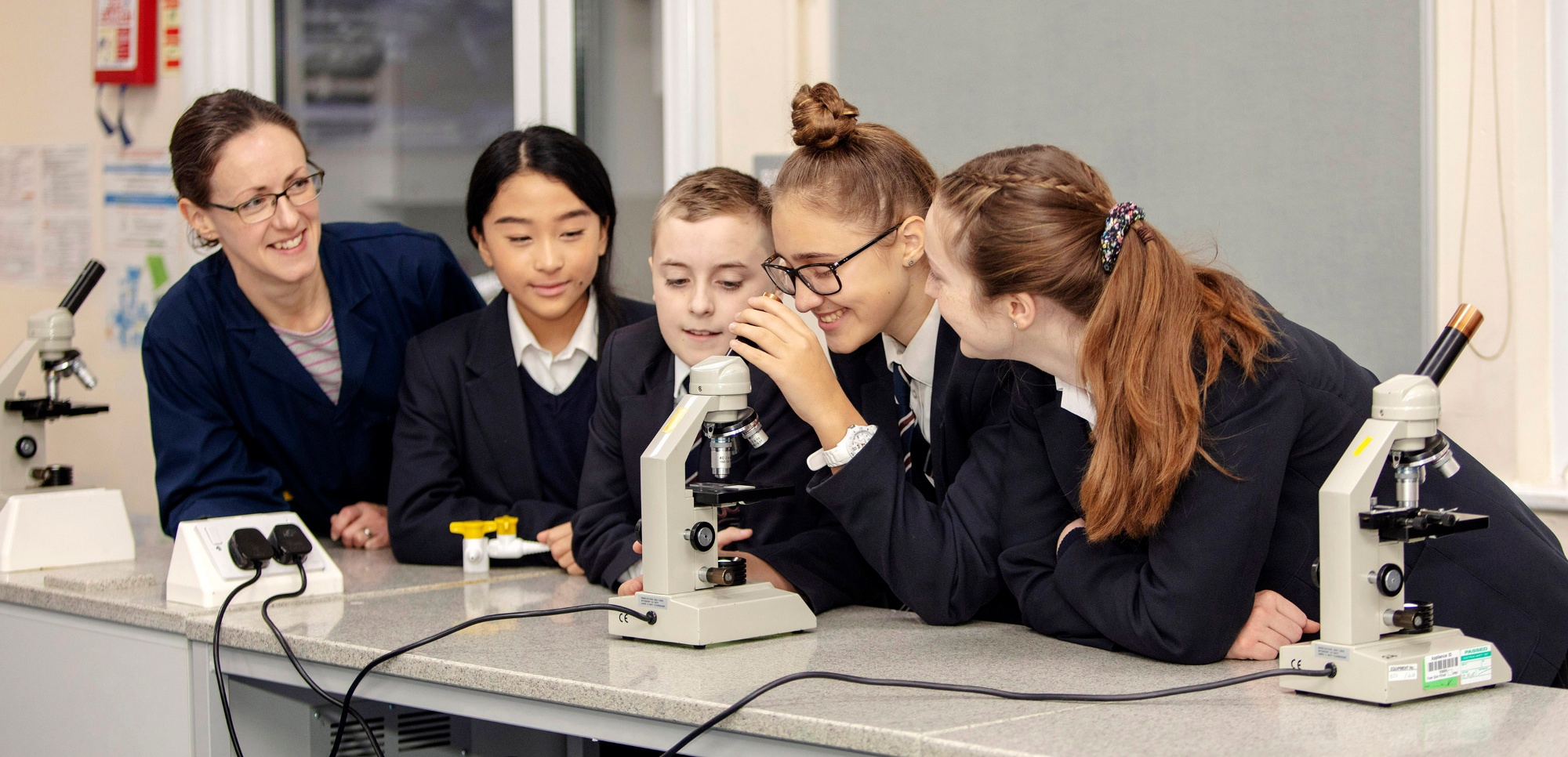Science
The science department offers Combined Science and Separate Sciences.
Examination Board: AQA
Qualification: GCSE Combined Science Trilogy
GCSE Biology, Chemistry & Physics
Aims
The GCSE Combined Science specification has separate units covering Biology, Chemistry and Physics. Scientific working is integrated into and delivered throughout the course.
Students will be given opportunities to:
-
Acquire scientific knowledge and understanding
-
Develop experimental and investigative abilities
-
Develop an understanding of how science works in everyday life
-
Develop an understanding of the applications and implications of science
-
Separate science students will receive a deeper education and understanding in the three sciences
Combined Science
Students following the combined science will study two hours of biology, chemistry and physics a week.
Assessment
This is a linear course which will be examined May/June. They will be assessed in six formal written papers of 1 hour 15 minutes each: two Biology, two Chemistry and two Physics. Each will assess different topics. Students are also required to complete sixteen practicals. This course will lead to two GCSEs graded 9-1.
|
AQA Title |
|
|
Assessment |
|
GCSE Trilogy Biology
|
Biology Paper 1 Topics 1-4 |
Biology Paper 2 Topics 5-7 |
Written examination paper 2 x 1 hr 15mins 33.3% |
|
GCSE Trilogy Chemistry |
Chemistry Paper 1 Topics 1-5 |
Chemistry Paper 2 Topics 6-10 |
Written examination paper 2 x 1 hr 15mins 33.3% |
|
GCSE Trilogy Physics |
Physics Paper 1 Topics 1-4 |
Physics Paper 2 Topics 5-7 |
Written examination paper 2 x 1 hr 15mins 33.3% |
Separate Sciences Award
If students are offered the Separate Science course they will need:
-
An enthusiasm for the subject
-
The ability to work at a fast pace
-
An enjoyment of practical/investigative work
-
The ability to work safely & independently
-
A willingness to discuss & explain scientific ideas
Approach and Topics
Students who take individual GCSEs in Biology, Chemistry and Physics, will be awarded three GCSE grades, a separate grade for each science at the end of the course. Students taking the Separate Sciences will study two hours of biology, chemistry and physics a week. The separate science course covers the same topics as the combined course but there is extra content in all three sciences and an extra physics topic covering space physics.
The extra science to be studied for the separate sciences is not necessarily more difficult than that covered in the combined science but will give students a much broader foundation to prepare them for post-16 qualifications in science, such as A levels in Biology, Chemistry, Physics, Psychology, Environmental Science.
Whilst it is not compulsory for students taking A levels in the sciences to have completed the separate science course, all state schools offer separate sciences, and so the expectation is likely to be greater.
Assessment
There will be two 1 hour 45 minute written exams for Biology, Chemistry and Physics, to be taken at the end of the course. Each exam is worth 50% of the final grade. There are also eight mandatory practicals to complete in each science.
The table below summarizes this:
|
AQA Title |
|
|
Assessment |
|
GCSE Biology
|
Biology Paper 1 Topics 1-4 |
Biology Paper 2 Topics 5-7 |
Written examination paper 2 x 1 hr 45mins 100% |
|
GCSE Chemistry |
Chemistry Paper 1 Topics 1-5 |
Chemistry Paper 2 Topics 6-10 |
Written examination paper 2 x 1 hr 45mins 100% |
|
GCSE Physics |
Physics Paper 1 Topics 1-4 |
Physics Paper 2 Topics 5-8 |
Written examination paper 2 x 1 hr 45mins 100% |
Summary of Content
Biology
Cell biology
Organisation
Infection and response
Bioenergetics
Homeostasis and response
Inheritance, variation and evolution
Ecology
Physics
Energy
Electricity
Particle model of matter
Atomic structure
Forces
Waves
Magnetism and electromagnetism
Space Physics (Separate science course only)



